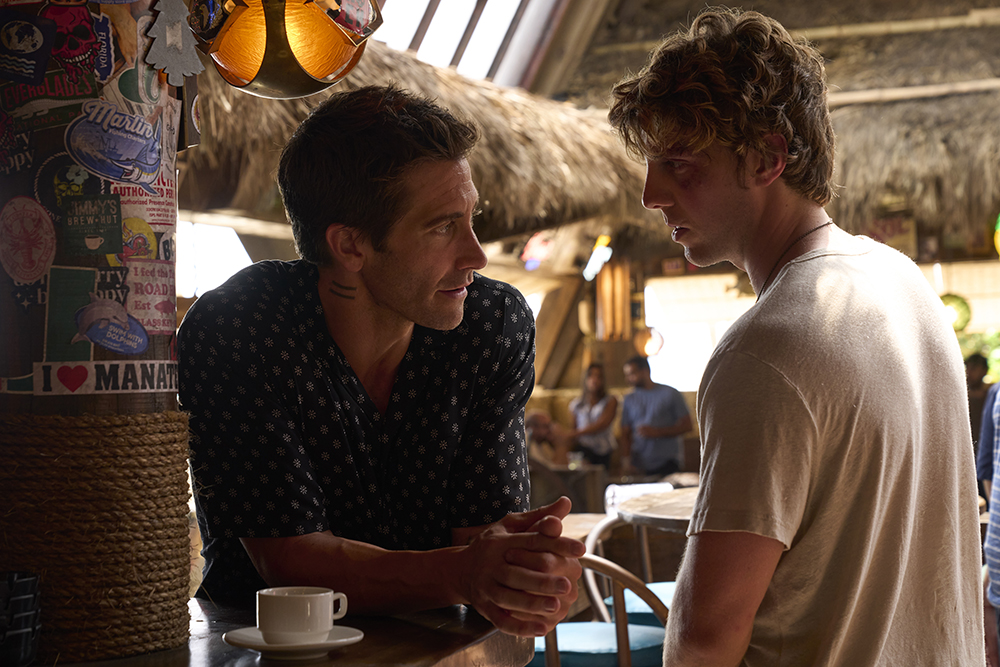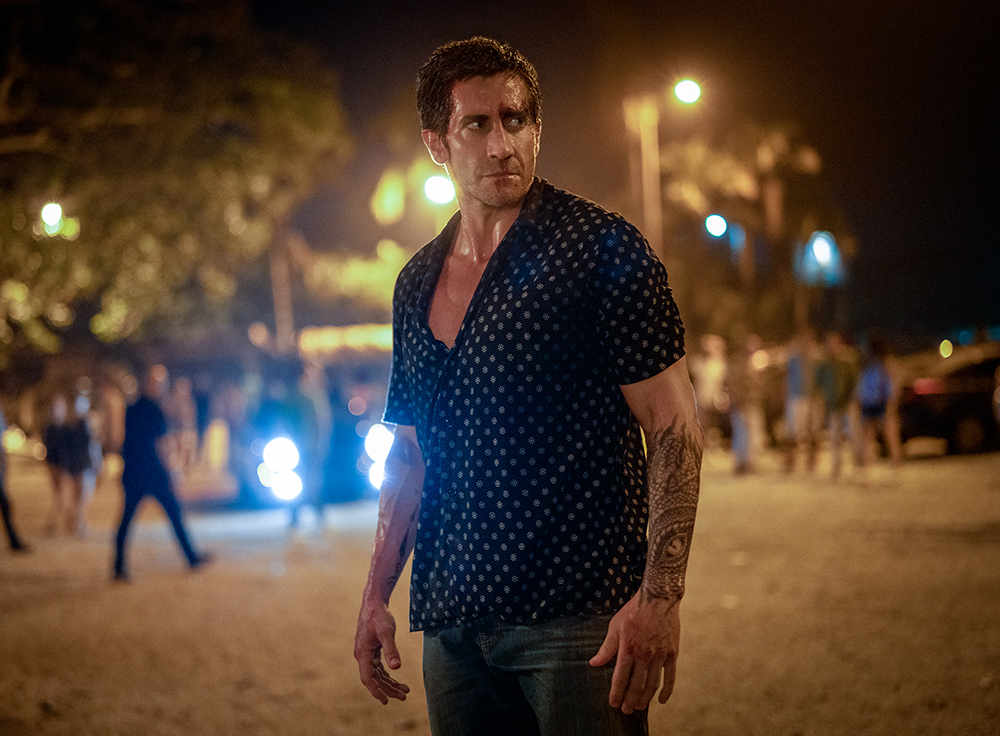The original “Road House” was a cult classic—albeit it with writing missteps—so it should come as no surprise the 2024 redux suffers the same problems. The new film, with Jake Gyllenhaal at the helm, is also mostly about action, and low on story, with very little in the way of the art of bouncing to buffer it. And while the 1989 film left Patrick Swayze’s character in ill-defined intrigue that was never resolved, this “Road House” offers Gyllenhaal’s ‘Dalton’ more of a background—and trauma—to pull from. Written by a trio of writers (Anthony Bagarozzi, Chuck Mondry, and R. Lance Hill), the film exists mainly as an homage to the original while upping the ante for the times. It works as an action film, though, and is saved almost entirely by the performance Gyllenhaal brings to the table.
The story of “Road House” has always been about a man of rough and tumble means that is tasked with rescuing a bar that is run amok with miscreants and troublemakers. In the original it was a podunk Missouri town, and here it is a small town in the Florida Keys. The change of venue works in terms of bringing sunshine and ocean vistas, but suffers in losing that isolated feeling the ’89 film had.
Remaking an ’80s Cult Classic
Also gone this time around is the attention original director Rowdy Herrington put into the art of bouncer science and the time Dalton spends getting to know the bar staff before stepping in to help. One thing that stands apart, though, is the personality Director Doug Liman and Gyllenhaal put into Dalton this time around. He has believable demons wisdom. He seems like someone that doesn’t want to fight but knows sometimes it’s inevitable. Gyllenhaal’s also funny and charming, while carrying that same punching bag, learned helplessness he used in the solid “Southpaw.”
Where “Road House” suffers is it feels like R. Lance Hill (who co-wrote the original) distilled the slow-burn elements of that film into a dark comedy—that wants to be a drama—and just let it run. That comedy often comes from the beatings and wounds Dalton receives, which he barely notices. An opening scene where Dalton is knifed in a parking lot, but saunters over to his car to grab some duct tape before pulling the knife out— while having a genial conversation—is played rightly for dark humor.

This follows during Dalton’s first fight at the Road House (yes, that’s the bar’s name), where he warns a group of troublemakers not to bother before slap fighting them, all while showing genuine concern for their medical conditions. He subsequently drives them to the hospital—25 miles away—and the way Dalton warns ‘bump’ as they hit a road bump to give them time to brace themselves is rightly hysterical. Of course it’s here Dalton meets an attractive ER doc (Daniela Melchior), because, like the original, the film must tease a romance for its anti-hero that goes absolutely nowhere.
A Slight Upgrade on Villains
Liman’s film tries, though, and there’s something more believable about its chief villain this rendition. There was something ludicrous about Ben Gazzara’s Brad Wesley last time around, a mafia type that ran the whole town. 2024’s answer is Billy Magnussen playing Ben Brandt, a feckless daddy’s boy who tries his hand at being tough while his father’s in prison. Ben wants to tear down the Road House to make way for a resort, and Magnussen plays him with that same crocodile-smile-hiding-insanity he did in 2021’s “No Time to Die.” Brandt has a host of goons that are pretty terrible at the jobs he’s given them, but in a departure from boss types in films like this, Ben’s equally aloof and never really punishes them. His scenes with Gyllenhaal are hit or miss. The film tries to make him sadistic at the end, which more of less flounders.
The biggest criticism of “Road House”—though it likely sounded good on paper—is making Dalton an ex MMA star, albeit disgraced, and the time and attention it gives to the sport. Dalton has tortured dreams where he relives a fight he had that ends in a fatality. And while this is included for rational reasons (i.e. he can’t let it go and fears becoming that guy again), the cynic in me feels it was included for no other reason than an excuse to include UFC bad boy Conor McGregor as a late villain added to the story.
Gyllenhaal Saves a Meandering Film
McGregor’s ‘Knox’ is called in by Brandt’s father against his son’s wishes; he basically spends the rest of the story trying to kill Dalton and beat up anyone who gets in his way. He flaunts his physical prowess with gaudy outfits showing off his muscles and boasts his Irish heritage, though he sounds, instead, like he’s doing his best Kano impression from “Mortal Kombat.” I dislike writing phrases like this, but “Road House” could have written out Knox’s character with little-to-no loss whatsoever, and used that time to develop Dalton and his on-screen relationships more (specifically between Daniela Melchior’s ‘Ellie’ and Jessica Williams’ ‘Frankie,’ who owns the bar that hired him).
Despite these missteps, “Road House” is entertaining, though almost solely due to Gyllenhaal’s acting. And the ends scenes—hinting at an absolution for Dalton—feel appropriate, and show a sweet ending for two of the film’s most innocent characters. The fight choreography is well done, and Gyllenhaal has the physical presence and tangible regret that makes his Dalton worth rooting for. The Florida vistas are breathtaking and it makes 7 Mile Bridge all the more lovable knowing that ‘Fred the Tree’ is real. Despite “Road House’s” lack of urgency and adding yet another addition to modern cinema’s remake craze, it’s fun enough as an action film if you’re looking for a time-filler while endlessly scrolling through Amazon’s streaming options.
“Road House” is an Amazon Original and is available to stream for free with an Prime subscription.

